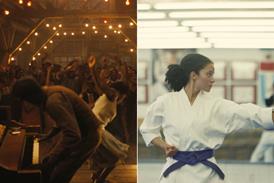In 2005, Risa Morimoto learned her late uncle was a kamikaze, one of the suicide pilots of Imperial Japan during the Second World War. For an outside observer, the more startling aspect of her discovery is that her uncle only died 20 years ago - he survived the war.
If there is a theme among the world premieres at the Hot Docs Canadian Documentary Film Festival (April 19-29) it is of film-makers' personal journeys into dark places, of the contrast of one person's hate with another's love - and sometimes in the same person.
In her film, Wings Of Defeat, a US-Japan co-production, Morimoto travels to Japan to interview four kamikaze survivors, who, through fateful mechanical failure or circumstances still more miraculous, were unable to complete their suicide missions. The film subverts all Western preconceptions of these infamous flyers - from the notion that all died, to their assumed zealotry - while providing a modern resonance regarding the dangers of fanaticism and militarism; of men crashing airplanes into things.
And it also subverts some Japanese notions of how kamikaze pilots felt about their mission - including criticism of the emperor, a bold stance to this day.
"This movie could not have been made 10 years ago," says Morimoto. "They wouldn't have been ready to talk. There's an urgency because they are dying."
Morimoto was born in the US to Japanese emigres. Growing up, she hated going to school on December 7, the anniversary of the Japanese surprise attack on Pearl Harbor. "I couldn't reconcile the man I knew, who was very gentle and sweet, with the propaganda," says Morimoto. Meanwhile, her collaborator and fellow producer, Linda Hoaglund, was born in rural Japan to American missionaries. Going to school there, she dreaded any mention of Hiroshima. She learned the songs praising the kamikaze spirit, the gods who had sacrificed themselves against US invaders who fire-bombed Japan's cities. Hoaglund and Morimoto were born to make this film.
Investigating identity
In a way, Jamie Kastner was born to make his film too. At least, that is the conceit of Kike Like Me, wherein the Toronto-based Kastner poses as a Jew and travels the world to announce this fact to people to gauge their reactions. Inspired by John Howard Griffin's 1959 book Black Like Me as well as the 1947 film Gentlemen's Agreement, wherein the gentile journalist Gregory Peck assumes a Jewish identity for research and then suffers the consequences, Kastner travels from Jerusalem to Berlin to Auschwitz to ask: "Who gets to choose identity' Is it you or the people who behold you' What if it's the people who hate you'"
When his subjects - from US conservative Pat Buchanan to the champion of Berlin's Holocaust Memorial - ask him if he is Jewish, he wants to know why they want to know.
As the title suggests, Kike Like Me is as deliberately provocative as Borat. But Kastner's presentation is anti-Borat, laconic to the extreme. In a long-abandoned synagogue in Krakow, Poland, Kastner is searching for one of the city's few remaining Jews from the 16,000 murdered during the Holocaust. His tour guide thinks the caretaker might be Jewish. But he must pay before he is allowed to film. He asks her if she is Jewish. No, Polish, she says. Kastner asks for his money back. The baffled woman hands back the money and looks to the tour guide. "It must be a custom," she says.
"Identity is in the eye of the beholder," says Kastner. "These kind of personal journey films will start with a film-maker saying who they are and where they come from and what that means to where they are going. It was more interesting to me to turn the issue of who I am or might be back on to the audience, to make them ask themselves why they are asking."
In that sense, Bryan Friedman's debut film, The Bodybuilder And I, is conventional. But the Toronto debut film-maker's subject is so unconventional that one has to give him credit just for making the film. Friedman's estranged father - he left the family when Bryan was an infant - is 59 and a competitive bodybuilder determined to reclaim the world championship in the Grand Master category. Watching his dad work out with his trainers day after day, the younger Friedman exposes his darkest feelings about the man - the sense of abandonment, the fear that "the bad-father, bad-husband gene" might be in his own DNA - and then uses the camera to tunnel through the wall between them "26-years thick".
Ultimately, Friedman's achievement is making us care not just about a boy reconciling with his father but about the outcome of the body-building contest.

















No comments yet